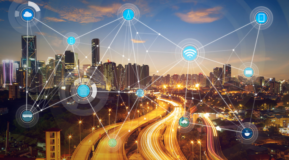
Seemingly yesterday, you managed a workplace model centered on corporate-issued devices, many of them desktops, and on-site applications. Then came teleworking, BYOD and eventually anytime, anywhere work, requiring your team to support and secure 24/7 access to cloud collaboration tools and a host of mobile devices connecting to your network.
Now, the rapid advances in mobility and real-time collaboration are causing an even more dramatic workplace paradigm shift.
Smart digital workplaces on the rise
Driven by the fierce competition to attract the best digital native Millennials and Gen Z workers, #genmobile, while simultaneously retaining experienced employees, enterprises across the industry spectrum are recognizing they should adapt workplace experiences to help meet the changing expectations of high-performing knowledge workers.
As a result, the very nature of the term "workplace" is being transformed. Companies are reevaluating their real estate strategies to embrace smart digital workplaces, where having effective space is just as critical as having enough, energy efficient space.
In smart digital workplaces, effective space is experience-centric to accommodate work styles spanning generations and personality types. Such accommodations range from quiet spaces for individualized work to an array of collaboration areas for those who thrive on interacting with others in various untethered settings throughout the workday.
To make space an active participant in the broader workplace experience, some companies are converting vast cubical farms into carefully designed and furnished indoor neighborhoods that support activity-based work with free-address seating.
Generally, this workplace model might include traditional open and enclosed workspaces, sit-to-stand desks, concentration areas for heads-down work, phone booths for conference calls, huddle spaces for small group collaboration, soft seating for more informal discussions and various-sized smart meeting rooms with advanced presentation amenities.
The workplace might also include an array of informal indoor and outdoor open areas – like coffee shops, specialty restaurants, balconies and patios.
At the infrastructure level, IoT is a key enabling technology for smart digital workplaces. Whether it's building sensors for lighting and temperature, cloud-connected furniture or smart conference rooms, IoT devices paired with location awareness and strong security solutions combine to help provide the safe, personalized mobility experiences that knowledge workers increasingly expect.
New collaboration model vital to getting spaces right for users
The emergence of smart digital workplaces also ushers in new processes for creating such spaces. IT solutions, building systems and furnishings should interact harmoniously with humans in a smart digital workplace. Gone are the days when real estate, IT and HR teams meet for the first time near the end of multi-million dollar projects.
Instead, these three historically separate constituencies should collaborate on smart digital workplace initiatives from the outset. In fact, we've seen early smart digital workplace efforts falter precisely because these groups failed to interact from the beginning, such as when real estate insufficiently understands the network bandwidth required to handle the building and furniture sensor traffic load.
Further, without human capital involvement, real estate and IT lack insight into whether their plans will meet user expectations. Also, for workers to understand what's expected when utilizing spaces and amenities, HR needs to develop corresponding policies and processes, beyond traditional benefits and payroll options, which contribute to positive experiences.
To ensure these three teams – and potentially others such as security – collaborate effectively, C-suite leadership must set the tone. This includes a significant integration expectation not previously required from these groups.
Successful efforts start by establishing a multi-disciplinary steering committee, with a combined budget and a regular meeting schedule. In addition to their immediate projects, committees must also consider the broader space strategy. Of critical concern is discussing how the longer-term IT roadmap will impact physical spaces and human resource needs. Advances in building system components, such as maintenance or security robots, should also be on the docket.
Leverage a complete ecosystem
As we've worked with our clients on smart digital workplaces initiatives, we've observed the vital role of intelligent and innovative enabling technologies. That's why we've chosen to join the ArubaEdge partnership program.
By collaborating with Aruba, a Hewlett Packard Enterprise company, we can offer our customers an exceptional collection of technologies that integrate seamlessly to deliver the smart digital workplace experiences our clients need to stay competitive.
We're also excited by the opportunity to contribute our thought leadership, insights and experience with other ArubaEdge alliance partners, we believe our combined strengths can provide the expertise necessary to bring IT, real estate, HR and other functions together to create the most engaging and successful smart digital workplaces.
Stay ahead of the rest
Regardless of your enterprise's specific situation, when spaces become active participants in the user experience it benefits the bottom line.
Only by creating effective, user-centric environments for your workforce will you achieve your desired employee recruitment, retention and productivity goals. After all, workers who feel comfortable in a space get their tasks done. Those who don't will eventually move on to a more inviting option.
Francisco J. Acoba MCR SLCR is a Managing Director in Deloitte Consulting LLP's Strategy & Operations practice and is the U.S. Lead for Deloitte Consulting's Global Real Estate Transformation capability. Acoba has more than 20 years of global experience providing management consulting services to corporate services, corporate real estate, workplace, and facilities management organizations within Fortune 500 companies and the world's largest public sector entities.
As used in this blog, "Deloitte" means Deloitte Consulting LLP, a subsidiary of Deloitte LLP. Please see www.deloitte.com/us/about for a detailed description of our legal structure. Certain services may not be available to attest clients under the rules and regulations of public accounting.
To find out more about becoming a smart digital workplaces leader, or staying ahead of your competition, access information about how your enterprise can leveraging the broader ArubaEdge partnership by clicking here: http://www.arubanetworks.com/partners/ecosystem/




